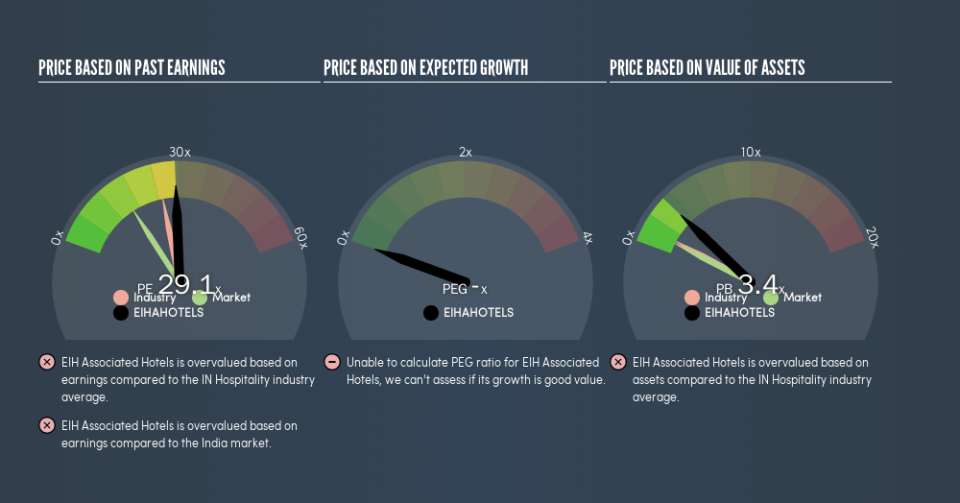Should You Be Tempted To Sell EIH Associated Hotels Limited (NSE:EIHAHOTELS) Because Of Its P/E Ratio?

Want to participate in a short research study? Help shape the future of investing tools and you could win a $250 gift card!
This article is for investors who would like to improve their understanding of price to earnings ratios (P/E ratios). To keep it practical, we'll show how EIH Associated Hotels Limited's (NSE:EIHAHOTELS) P/E ratio could help you assess the value on offer. What is EIH Associated Hotels's P/E ratio? Well, based on the last twelve months it is 29.06. That corresponds to an earnings yield of approximately 3.4%.
Check out our latest analysis for EIH Associated Hotels
How Do You Calculate EIH Associated Hotels's P/E Ratio?
The formula for price to earnings is:
Price to Earnings Ratio = Price per Share ÷ Earnings per Share (EPS)
Or for EIH Associated Hotels:
P/E of 29.06 = ₹361.8 ÷ ₹12.45 (Based on the trailing twelve months to March 2019.)
Is A High Price-to-Earnings Ratio Good?
A higher P/E ratio means that buyers have to pay a higher price for each ₹1 the company has earned over the last year. That isn't a good or a bad thing on its own, but a high P/E means that buyers have a higher opinion of the business's prospects, relative to stocks with a lower P/E.
How Growth Rates Impact P/E Ratios
When earnings fall, the 'E' decreases, over time. Therefore, even if you pay a low multiple of earnings now, that multiple will become higher in the future. Then, a higher P/E might scare off shareholders, pushing the share price down.
EIH Associated Hotels had pretty flat EPS growth in the last year. But it has grown its earnings per share by 10.0% per year over the last five years.
How Does EIH Associated Hotels's P/E Ratio Compare To Its Peers?
We can get an indication of market expectations by looking at the P/E ratio. The image below shows that EIH Associated Hotels has a higher P/E than the average (25.1) P/E for companies in the hospitality industry.
Its relatively high P/E ratio indicates that EIH Associated Hotels shareholders think it will perform better than other companies in its industry classification. Clearly the market expects growth, but it isn't guaranteed. So investors should delve deeper. I like to check if company insiders have been buying or selling.
Remember: P/E Ratios Don't Consider The Balance Sheet
One drawback of using a P/E ratio is that it considers market capitalization, but not the balance sheet. In other words, it does not consider any debt or cash that the company may have on the balance sheet. In theory, a company can lower its future P/E ratio by using cash or debt to invest in growth.
While growth expenditure doesn't always pay off, the point is that it is a good option to have; but one that the P/E ratio ignores.
How Does EIH Associated Hotels's Debt Impact Its P/E Ratio?
Since EIH Associated Hotels holds net cash of ₹826m, it can spend on growth, justifying a higher P/E ratio than otherwise.
The Verdict On EIH Associated Hotels's P/E Ratio
EIH Associated Hotels has a P/E of 29.1. That's higher than the average in the IN market, which is 16. Earnings improved over the last year. And the healthy balance sheet means the company can sustain growth while the P/E suggests shareholders think it will.
Investors have an opportunity when market expectations about a stock are wrong. People often underestimate remarkable growth -- so investors can make money when fast growth is not fully appreciated. We don't have analyst forecasts, but you might want to assess this data-rich visualization of earnings, revenue and cash flow.
But note: EIH Associated Hotels may not be the best stock to buy. So take a peek at this free list of interesting companies with strong recent earnings growth (and a P/E ratio below 20).
We aim to bring you long-term focused research analysis driven by fundamental data. Note that our analysis may not factor in the latest price-sensitive company announcements or qualitative material.
If you spot an error that warrants correction, please contact the editor at editorial-team@simplywallst.com. This article by Simply Wall St is general in nature. It does not constitute a recommendation to buy or sell any stock, and does not take account of your objectives, or your financial situation. Simply Wall St has no position in the stocks mentioned. Thank you for reading.

